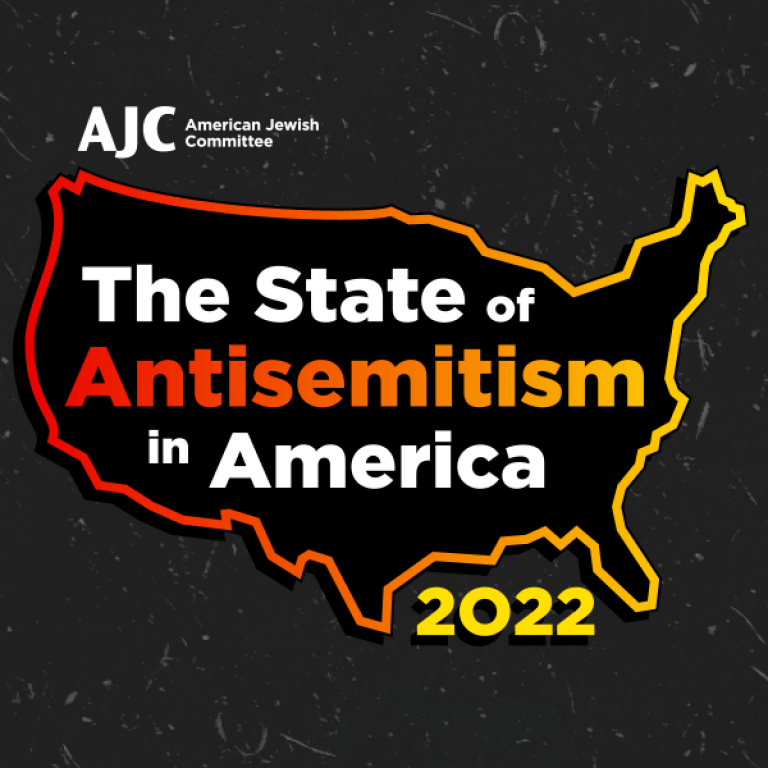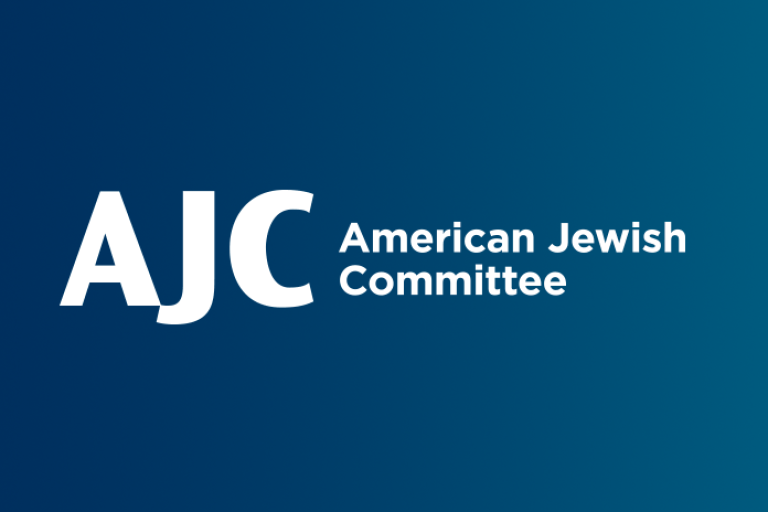February 13, 2023
For too many American Jews, being Jewish no longer feels as safe as it once did. And the younger those American Jews are, the more they experience that threat firsthand.
An American Jewish Committee (AJC) study released this week sheds light on that heartbreaking reality and more. How affected are American Jews by rising antisemitism? Does the general public understand the weight they carry?
Based on parallel surveys of American Jews and the U.S. general public on their perceptions and experiences of antisemitism in the U.S, AJC’s State of Antisemitism in America Report 2022 is the most comprehensive of its kind.
Here are five key takeaways from the report.
- More Jews feel less secure in America.
Over four in ten (41%) of American Jews feel their status is less secure than it was a year ago. That’s up 10 percentage points from 31% who reported feeling less secure in 2021. That sense of security has eroded, they say, primarily due in large part to the rise in antisemitic attacks, crimes, and violence; and how acceptable antisemitism and racism have become.
To prevent antisemitism from becoming normalized, Americans must speak out against antisemitic tropes and conspiracy theories, which affect all of us.
“One best practice in fighting antisemitism is when leaders of other communities do the speaking. People are more likely to listen to those they know, those they trust, and those who are like them,” said Holly Huffnagle, AJC’s U.S. Director of Combating Antisemitism. “This is why we need white evangelical leaders to disavow white supremacy and antisemitic conspiracy theories like QAnon. We need Black leaders to condemn Louis Farrakhan’s antisemitism. We need Muslim leaders to condemn antisemitism or antisemitic tropes when they appear in their own communities and Latino leaders to speak out against antisemitism in their communities.”
Test your Knowledge of Antisemitism in America
Nine in 10 American Jews (89%) think antisemitism is a problem in the U.S., and eight in 10 (82%) say it has increased in the past five years.
The hostage situation inside a synagogue in Colleyville, Texas in January 2022 also has raised anxiety levels. For American Jews who had heard something or a lot about Jews being taken hostage in Colleyville, the majority said it made them feel a great deal (18%) or a fair amount (33%) less safe as a Jewish person in the United States, and over a third (36%) said it made them feel a little less safe.
The feelings of insecurity are even greater among young Jewish adults who heard about the crisis, in which a gunman held three congregants and a rabbi hostage for 11 hours during Shabbat until they escaped. Among young Jewish adults ages 18 to 29 who heard a lot or some about the Colleyville hostage situation, 67% felt a great deal or a fair amount less safe at the time, compared with 47% of those 30 and older who felt the same.
Likewise, one in five American Jewish respondents (19%) said, because of antisemitism, they feel unsafe (somewhat or very) when attending synagogues, Jewish day schools, community centers, or any of the Jewish institutions with which they are affiliated. Meanwhile, confidence in law enforcement also seems to be on a downward trend. 63% of American Jewish respondents say law enforcement is effective in responding to the security needs of Jews. Among Orthodox Jews surveyed, 65% say law enforcement is effective in addressing their needs, a sharp decrease from 81% in 2021.
2. American Jews are proud, but altering behavior out of fear.
The lingering presence of antisemitism has altered how some American Jews conduct their day-to-day lives and even whether they publicly identify as Jewish this past year. This includes the 23% of Jewish adults who said they have avoided publicly wearing, carrying, or displaying things that might help people identify them as Jewish; and the 16% who said they have avoided certain places, events, or situations because they are Jewish, out of concerns for their safety or comfort.
Likewise, one in five American Jewish respondents (19%) said, because of antisemitism, they feel unsafe (somewhat or very) when attending synagogues, Jewish day schools, community centers, or any of the Jewish institutions with which they are affiliated.
One in four (26%) American Jews reported being personally targeted by antisemitism in 2022 – a number that hasn’t declined since the survey question was first asked in 2019. While the number has not climbed, the fact that the threat has not waned is still troubling.
“When we first did this survey in 2019, the results were surprising for many people. They were still much higher in Europe, but we didn’t think it would be even this high in the U.S.,” Huffnagle said. “To see the consistency over the years confirms our trust in the data, but it’s troubling to see.”
Overall, four in ten (38%) American Jews reported changing their behavior at least once out of fear of antisemitism.
Meanwhile, half of American Jewish institutions have boosted security measures in the last two years. But it is equally important to note the majority of Jews have not changed their behavior and still publicly identify as Jewish.
“While the survey is about American Jewish experiences with antisemitism, we also don’t want the focus to solely be on the negative and empower the antisemites,” Huffnagle said. “While nine in 10 say antisemitism is a problem, the majority are still going to synagogue and feel safe. They’re not taking off their Magen Davids or kippot. We need to point out that any Jew who is changing their behavior is one too many. But for the majority, it remains possible to be proudly Jewish. At the end of the day, it’s about community resilience.”
3. Antisemitism online and on social media is a continuing threat. But young American Jews experience it differently.
While one in eight American Jews (13%) were personally targeted by an antisemitic remark or post online or through social media in the past 12 months, among young American Jews between the ages of 18 and 29, roughly one in five (19%) say they were. (Antisemitism “experienced online” includes Jewish adults who were personally targeted and/or those who had seen it.)
In addition, almost two-thirds of American Jews (67%) have seen antisemitism online or on social media in the past year.
And 84% of Jewish adults under age 30 say they have seen this hateful content in the past year. Taken together with those who were personally targeted, fully 85% of young American Jews – those ages 18 to 29 – were the target of antisemitism online or have seen it online at least once in the past 12 months (compared with 64% of Jews age 30 or older).
For one in four of these young American Jews (26%), the antisemitism experienced online made them feel physically threatened, compared to 14% of their older counterparts.
“Growing up in an era of social media and with a cultural focus on intersectional identity, young Jews increasingly feel alienated and, at times attacked, online and in their social circles,” noted Meggie Wyschogrod Fredman, Senior Director of the Alexander Young Leadership Department. Huffnagle agreed and added, “Many people do not know who Jews are. They see Jews solely as a religious group and antisemitism solely as a religious hatred. This is why we must ensure Jewish diversity and inclusion, alongside addressing antisemitism, is foundational within DEI to help prevent incidents of anti-Jewish bias in the workplace. After all, stereotypes about Jews have even prevented them from being included within DEI spaces. This must change.” Read AJC’s answers to ten tough questions about antisemitism.
Almost 3 in 10 (27%) of all American Jewish respondents avoided posting content online that would identify you as a Jew or reveal your views on Jewish issues. This number jumps to 37% for young American Jews, ages 18-29, compared to 24% of U.S. adults 30 and older.
4. American Jews pursuing higher education are experiencing some lows.
Chants of “From the River to the Sea,” calls for an intifada, threats of lower grades if they support Israel. These are just some of the affronts that Jewish college students faced this past year. You can read about them here in AJC’s Behind the Numbers, which features interviews with American Jews about how rising antisemitism impacts their daily lives.
As part of the report, AJC surveyed American Jews who now attend or recently attended college or had children attending college. Those questions revealed that roughly one in ten American Jews with recent or current college experience have felt or been excluded from a group or an event on campus because they are Jewish. Slightly more (14%) have felt or been excluded from a campus group or event because of their assumed or actual connection to Israel. Just over a quarter (26%) say they have had trouble taking time off from class or have been told they could not miss class for the Jewish holidays.
“I think what's really important here is that these anxieties are leading to behavioral changes within Jewish college students,” Wyschogrod Fredman said. “And these are often changes that they feel forced to make. Students feel singled out for who they are and what they believe in.”
One in five American Jewish respondents (19%) feel unsafe attending Jewish institutions with which they are affiliated because of antisemitism. One in five (21%) say they have avoided wearing or carrying things that identify them as Jewish; and 18% say they have ever felt uncomfortable or unsafe at a campus event because they are Jewish.
5. Americans know antisemitism is a problem for society, but more can be done.
A possible silver lining of the survey is that more Americans know what antisemitism is this year compared to past years, and they also recognize it as a problem for society. Seven in 10 (69%) U.S. adults said they’d heard the term antisemitism and know what it means.
While this was an improvement from years past, it’s worth noting that the field research was conducted at the same time that the antisemitic rants and conspiracy theories spewed by rapper Kanye West, now known as Ye, made headlines and was met with considerable backlash throughout much of American society. In addition to inflammatory interviews, West’s Twitter posts threatening Jews reached a Twitter audience of more than 33 million followers.
Nearly half of American Jews (48%) – and almost six in ten (59%) Jewish young adults – still say antisemitism is taken less seriously than other forms of hate and bigotry. “Kanye West’s antisemitism, in many ways, was taken seriously,” Huffnagle said. “But for many in the Jewish community, it was a welcomed surprise given that much antisemitism of the last few years has not been taken seriously nor widely condemned. How do we continue to shine a spotlight on what is a daily reality for many American Jews? That is what we are doing now.”
More than one in three (36%) Americans reported seeing antisemitism at least once in the past year. Of those Americans, the majority saw it online or on social media (82%) followed by on the street (19%), in a store (14%), and in public transit (10%). But even though U.S. adults see antisemitism, only 22% think antisemitism is a very serious problem in the U.S. and only 16% say it has increased a lot in the past 5 years.
Thankfully, nine in ten Americans (91%) believe antisemitism is a problem for everyone and affects society as a whole. They resoundingly say antisemitism is not only a problem for Jews. In addition, nine in 10 Americans also believe that anti-Zionism, reflected in the phrase “Israel has no right to exist,” is antisemitic. Similarly, most Americans familiar with the anti-Israel Boycott, Divestment, and Sanctions (BDS) movement, believe it is either mostly antisemitic (39%) or has some antisemitic supporters (47%). These findings suggest significant progress has been made, but there is still work to be done.





